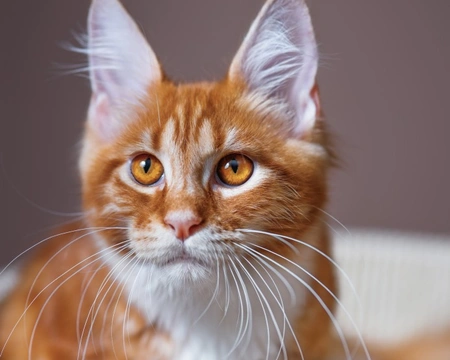
Cats and their blood groups
Just like humans (and dogs) cats have distinct blood groups, although there are only three different types in cats, as opposed to four major groups in humans and several others for dogs, and this can have an impact on what happens if your cat ever needed a blood transfusion. Blood groups are determined by a range of hereditary factors, and while it is reasonably rare for cats to need a blood transfusion, it can be useful to know your own cat’s group if they have a health condition that may necessitate a transfusion at some point.
In this article, we will look at the different feline blood types or blood groups in more detail, including how common each group is, ways to ascertain your cat’s group, and how blood transfusions and blood donations for cats work. Read on to learn more.
What are blood groups?
Blood groups (also known as blood types) are a way of classifying different types of blood, determined by the combination of antibodies (or their absence) and antigens (or their absence) that the body’s red blood cells carry on their surfaces. The antigens themselves can be comprised of carbohydrates, proteins, glycolipids or glycoproteins, depending on the group and classification system used.
The various different blood groups for each species (be they human or animal) are not compatible with each other (aside from universal donors and recipients), and an alien blood group will be rejected by the body, which is why knowing one’s blood group if a transfusion is required is so important.
However, it is entirely possible for a pregnant cat to carry a litter with a different blood type without any problems!
The three groups
In cats, the different blood groups are divided into three different types, called A, B and AB respectively. This means that of all the domestic cats in the world, each once possesses one of these three groups, and the vast majority of cats are either A or B, with the AB type being very rare and uncommon.
How common are the groups?
As mentioned, A and B are the two most common blood groups in cats, with AB being very rare.
A is by far the most prevalent blood type in cats, and for domestic moggies in the UK, it would be a reasonably safe bet that your cat would have the A blood group.
The B blood group is the next most common, and this group is slightly more prevalent across certain pedigree cat breeds, including the British shorthair, Persian and Sphinx gene pools.
Type AB on the other hand occurs in less than 1% of the feline population-however, cats with this blood type are what are referred to as universal recipients, meaning that they can receive a blood donation from a cat of either A B or AB blood groups. This makes transfusions easier to arrange for them than the others, as literally any cat can donate for them.
However, a type AB cat can only donate blood for another type AB cat, and there are no universal donor types within cats that can give to any other cat.
Finding out your cat’s blood group
The only way to find out for sure what your cat’s blood group is, is to have a blood sample taken and tested for the presence or absence of the relevant antibodies and antigens that dictate the blood type. The only reason why you would need to know your cat’s blood type is if they need a transfusion, in order to identify what type of donor they need, and this can be found out quickly if necessary.
However, if your cat suffers from a blood clotting disorder or is otherwise potentially prone to heavy bleeding, finding out their blood group in advance may be recommended by your vet.
If you do not need to know but are simply interested, the chances are that your cat is probably type A!
What if your cat needed a transfusion?
If your cat suffered from an injury or illness that required a blood transfusion, the first thing your vet would do is to test your cat to find out their blood group, and then try to source a donor. Because blood cannot be stored in the long term, it is entirely possible that your vet would need to find another cat to take blood from directly, and there are a variety of different options available there.
If you have another cat that meets the criteria for donation, your vet may ask to use them, failing which, the vet will put out a call for donors from a pool of cats that are registered. In some cases, clinics will actually have some of their staff’s own pets on their registry to donate blood in an emergency!
There are a couple of animal blood banks in the UK, and if your clinic is near enough and they have blood in stock, this may be an option too.
Could your cat donate blood?
If your cat is a young adult, in good health and of a suitable weight and has had all of their vaccinations and does not suffer from any health conditions, they could potentially become a blood donor. The Cat Blood Donors website contains more information, and full details of donor criteria.



